Noun Definition in Hindi
संज्ञा परिभाषा
Noun In Hindi And English
- A noun is a word used as the name of a person, place or ‘thing’.
किसी व्यक्ति, वस्तु, स्थान, गुण, कार्य या अवस्था के नाम को संज्ञा कहते हैं। - ‘Thing’ शब्द बहुत विस्तृत है इसमें सभी चीजों का समावेश हो जाता है।
Types of Noun in hindi
संज्ञा के प्रकार
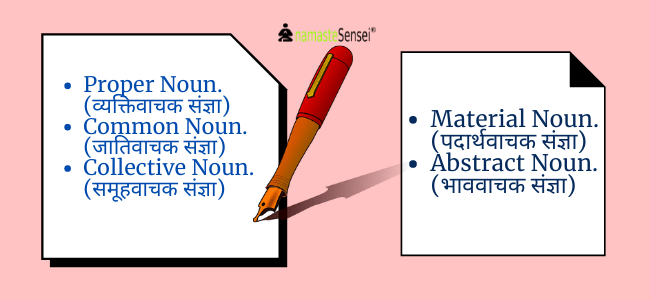
-
What are the different types of noun in hindi?
संज्ञा के विभिन्न प्रकार क्या हैं?
There are 5 types of noun.
संज्ञा पांच प्रकार के होते हैं।
- Proper Noun.
व्यक्तिवाचक संज्ञा - Common Noun.
जातिवाचक संज्ञा - Collective Noun.
समूहवाचक संज्ञा - Material Noun.
पदार्थवाचक संज्ञा - Abstract Noun.
भाववाचक संज्ञा
-
Proper Noun.
व्यक्तिवाचक संज्ञा

- A proper noun refers to the name of a person, place or thing.
व्यक्तिवाचक संज्ञा से किसी व्यक्ति, स्थान या वस्तु के नाम का बोध होता है।
Proper Noun Examples in Hindi
व्यक्तिवाचक संज्ञा उदाहरण
We explained some proper noun examples in Hindi and English below.
हमने नीचे हिंदी और अंग्रेजी में कुछ व्यक्तिवाचक संज्ञा उदाहरणों की व्याख्या की है।
- Ram is my friend.
राम मेरा मित्र है। - I live in Delhi.
मैं दिल्ली में रहता हूँ।
- Ram (राम), Delhi (दिल्ली) उपरोक्त वाक्यों में व्यक्तिवाचक संज्ञा के उदाहरण है।
आप नीचे दिए गए लेख में Proper Noun के बारे में विस्तार में पढ़ सकते हैं।
जरूर पढ़ें – Proper Noun – विस्तार में
-
Common Noun
जातिवाचक संज्ञा
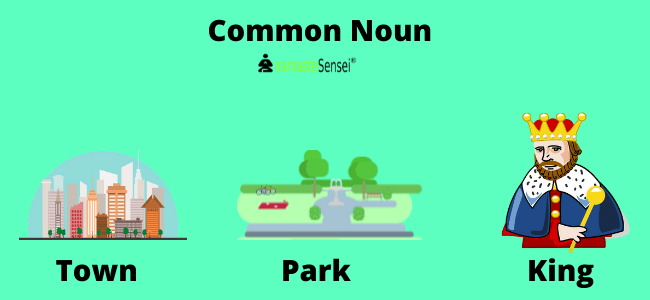
- A common noun refers to a person, place, or thing in a general sense.
जातिवाचक संज्ञा वह संज्ञा होती है जो सामान्य अर्थ में किसी व्यक्ति, स्थान, या वस्तु का बोध कराती है। - A common noun is written with a capital letter when it begins a sentence.
जब वाक्य शुरू हो तो जातिवाचक संज्ञा बड़े अक्षर से लिखना चाहिए।
Examples of Common nouns in Hindi
जातिवाचक संज्ञा उदाहरण
We explained some common noun examples in Hindi and English below.
हमने नीचे हिंदी और अंग्रेजी में कुछ जातिवाचक संज्ञा उदाहरणों की व्याख्या की है।
- The nearest town is 150 km away from here.
निकटतम शहर यहां से 150 किमी दूर है। - All the parks are closed today.
आज सभी पार्क बंद हैं। - The King makes laws for his people.
राजा अपनी प्रजा के लिए कानून बनाता है।
- Town (शहर), Parks (पार्क), King (राजा) उपरोक्त वाक्यों में जातिवाचक संज्ञा के उदाहरण है।
आप नीचे दिए गए लेख में Common Noun के बारे में विस्तार में पढ़ सकते हैं।
जरूर पढ़ें – Common Noun – विस्तार में
-
Collective Noun
समूहवाचक संज्ञा
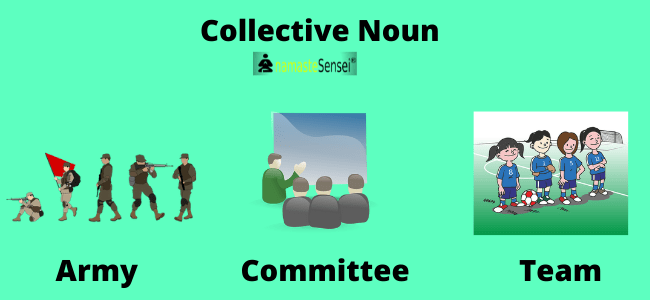
- A collective noun is the name of a group of persons or things taken together and spoken of as a whole, as a unit.
समूहवाचक संज्ञा व्यक्तियों या वस्तुओं के समूह का नाम है जिसे एक साथ लिया जाता है और समग्र रूप से, इकाई के रूप में बोला जाता है। - A collective noun is used as a Singular. If it is used as a plural then it becomes a Common Noun.
समूहवाचक संज्ञा का प्रयोग एकवचन के रूप में किया जाता है। यदि इसे बहुवचन के रूप में प्रयोग किया जाता है तो यह जातिवाचक संज्ञा बन जाता है।
Examples of Collective noun in Hindi
समूहवाचक संज्ञा उदाहरण
We explained some collective noun examples in Hindi and English below.
हमने नीचे हिंदी और अंग्रेजी में कुछ समूहवाचक संज्ञा उदाहरणों की व्याख्या की है।
- The army was too small to defend the town.
शहर की रक्षा के लिए सेना बहुत छोटी थी। - The committee take some important decisions.
समिति कुछ महत्वपूर्ण निर्णय लेती है। - Our football coach trains the team.
हमारे फुटबॉल कोच टीम को ट्रेनिंग देते हैं।
- Army (सेना), Committee (समिति), Team (टीम) उपरोक्त वाक्यों में समूहवाचक संज्ञा के उदाहरण है।
आप नीचे दिए गए लेख में Collective Noun के बारे में विस्तार में पढ़ सकते हैं।
जरूर पढ़ें – Collective Noun – विस्तार में
-
Material Noun
पदार्थवाचक संज्ञा
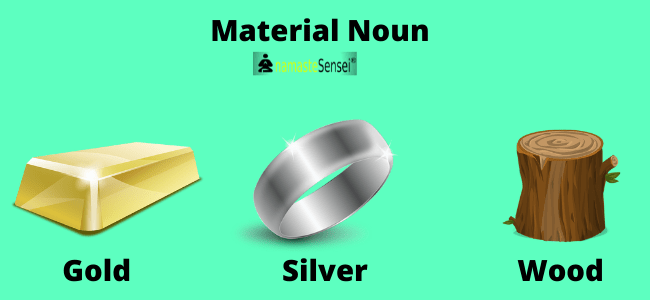
- A material noun is the name of a metal or substance, of which a thing is made.
पदार्थवाचक संज्ञा उस धातु या पदार्थ का नाम है, जिससे किसी वस्तु का निर्माण होता है।
Examples of Material Noun
पदार्थवाचक संज्ञा उदाहरण
We explained some material noun examples in Hindi and English below.
हमने नीचे हिंदी और अंग्रेजी में कुछ पदार्थवाचक संज्ञा उदाहरणों की व्याख्या की है।
- The necklace is made of gold.
हार सोने का बना है। - She has purchased a tea set of silver.
उसने चांदी का एक चाय का सेट खरीदा है। - He got his furniture made of teak wood.
उन्होंने अपना फर्नीचर सागौन की लकड़ी से बनवाया।
- Gold (सोने), Silver (चांदी), Wood (लकड़ी) उपरोक्त वाक्यों में पदार्थवाचक संज्ञा के उदाहरण है।
NOTE
- Material nouns are not countable i.e. they cannot be counted. They can be measured or weighed. Generally, a singular verb is used with them and the article is not used before them.
ध्यान दें – पदार्थवाचक संज्ञाएँ गणनीय नहीं होती अर्थात् उनकी गणना नहीं की जा सकती। उन्हें मापा या तौला जा सकता है। आमतौर पर इनके साथ एकवचन क्रिया का प्रयोग किया जाता है और इनके पहले लेख का प्रयोग नहीं किया जाता है।
आप नीचे दिए गए लेख में Material Noun के बारे में विस्तार में पढ़ सकते हैं।
जरूर पढ़ें – Material Noun – विस्तार में
-
Abstract Noun
भाववाचक संज्ञा
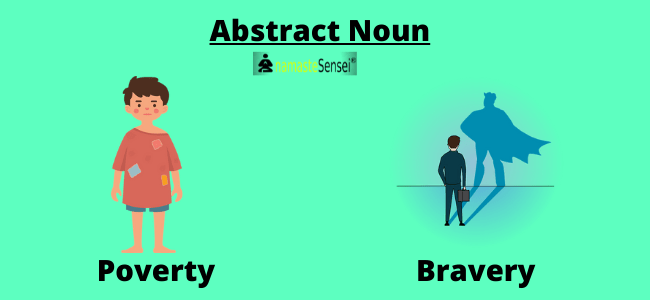
- Abstract Noun in general refers, the name of quality, action or state.
भाववाचक संज्ञा सामान्य रूप से गुण, क्रिया या अवस्था के नाम को दर्शाता है।
Examples of Abstract Nouns
भाववाचक संज्ञा उदाहरण
We explained some Abstract noun examples in Hindi and English below.
हमने नीचे हिंदी और अंग्रेजी में कुछ भाववाचक संज्ञा उदाहरणों की व्याख्या की है।
- Qualilty- Honesty (ईमानदारी), Bravery (वीरता).
- Action- Hatred (घृणा), Laughter (हंसी).
- State- Poverty (गरीबी), Young (युवा).
NOTE
- Abstract nouns express qualities, feelings, actions, and states that cannot be physically touched, cannot be seen, can only be felt.
भाववाचक संज्ञा ऐसे गुण, भाव, क्रिया एवं अवस्था को व्यक्त करता है जिन्हें शारीरिक रूप से स्पर्श नहीं किया जा सकता है, देखा नहीं जा सकता है, केवल महसूस किया जा सकता है। - Abstract nouns are usually used in the singular.
भाववाचक संज्ञा का प्रयोग सामान्यतः एकवचन मे किया जाता है।
आप नीचे दिए गए लेख में Abstract Noun के बारे में विस्तार में पढ़ सकते हैं।
जरूर पढ़ें – Abstract Noun – विस्तार में
Other types of Noun in hindi
अन्य प्रकार की संज्ञाएं
-
Countable Noun in hindi
गणनीय संज्ञा
- A countable noun has both a singular and a plural form, and it names anything (or anyone) that one can count.
गणनीय संज्ञा एकवचन और बहुवचन दोनों रूपों में मौजूद होती है, और यह कुछ भी (या किसी को) नाम देता है जिसे कोई भी गिन सकता है।
Examples of Countable Nouns in Hindi
गणनीय संज्ञा उदाहरण
We explained some Countable noun examples in Hindi and English below.
हमने नीचे हिंदी और अंग्रेजी में कुछ गणनीय संज्ञा उदाहरणों की व्याख्या की है।
- We painted the tables red and the chairs blue.
हमने टेबल लाल और कुर्सियों को नीला रंग दिया। - She found six silver dollars.
उसे छह चांदी के डॉलर मिले।
- Tables (टेबल), Chairs (कुर्सियों), Dollars (डॉलर) उपरोक्त वाक्यों में गणनीय संज्ञा के उदाहरण है।
आप नीचे दिए गए लेख में Countable Noun के बारे में विस्तार में पढ़ सकते हैं।
जरूर पढ़ें – Countable Noun – विस्तार में
-
Non Countable Noun in Hindi
गैर-गणनीय संज्ञा
- A noncountable noun does not have a plural form, which refers to something that one cannot usually count.
एक गैर-गणनीय संज्ञा एक संज्ञा है जिसका बहुवचन रूप नहीं है, जो किसी ऐसी चीज को संदर्भित करता है जिसे आमतौर पर गिना नहीं जा सकता है। - A non-countable noun always takes a singular verb in a sentence.
एक गैर-गणनीय संज्ञा हमेशा एक वाक्य में Singular Verb लेती है। - Non Countable nouns are similar to collective nouns, and are the opposite of countable nouns.
गैर-गणनीय संज्ञाएं समूहवाचक संज्ञा के समान होती हैं और गणनीय संज्ञाओं के विपरीत होती हैं।
Examples of Non-Countable nouns in Hindi
गैर-गणनीय संज्ञा उदाहरण
We explained some Non-Countable noun examples in Hindi and English below.
हमने नीचे हिंदी और अंग्रेजी में कुछ गैर-गणनीय संज्ञा उदाहरणों की व्याख्या की है।
- They decided to sell the furniture.
उन्होंने फर्नीचर बेचने का फैसला किया।
- Note – We cannot make the noun ‘furniture’ plural.
हम संज्ञा ‘फर्नीचर’ को बहुवचन नहीं बना सकते।
- The furniture is heaped in the middle of the room.
कमरे के बीच में फर्नीचर का ढेर लगा हुआ है।
- Note – Since ‘Furniture’ is a non-countable noun, it takes a singular verb, “is heaped.”
क्योंकि ‘फर्नीचर’ एक गैर-गणनीय संज्ञा है, यह Singular Verb लेता है, “is heaped.”
बधाई हो, आपने Noun in Hindi & Types of Noun in Hindi का पूरा लेख पढ़ा। यदि आपके कोई संदेह या प्रश्न हैं, तो बेझिझक नीचे टिप्पणी करें। हम जितनी जल्दी हो सकेगा संपर्क करेंगे।
More Articles:
Any topic you want us to cover. Let us know.
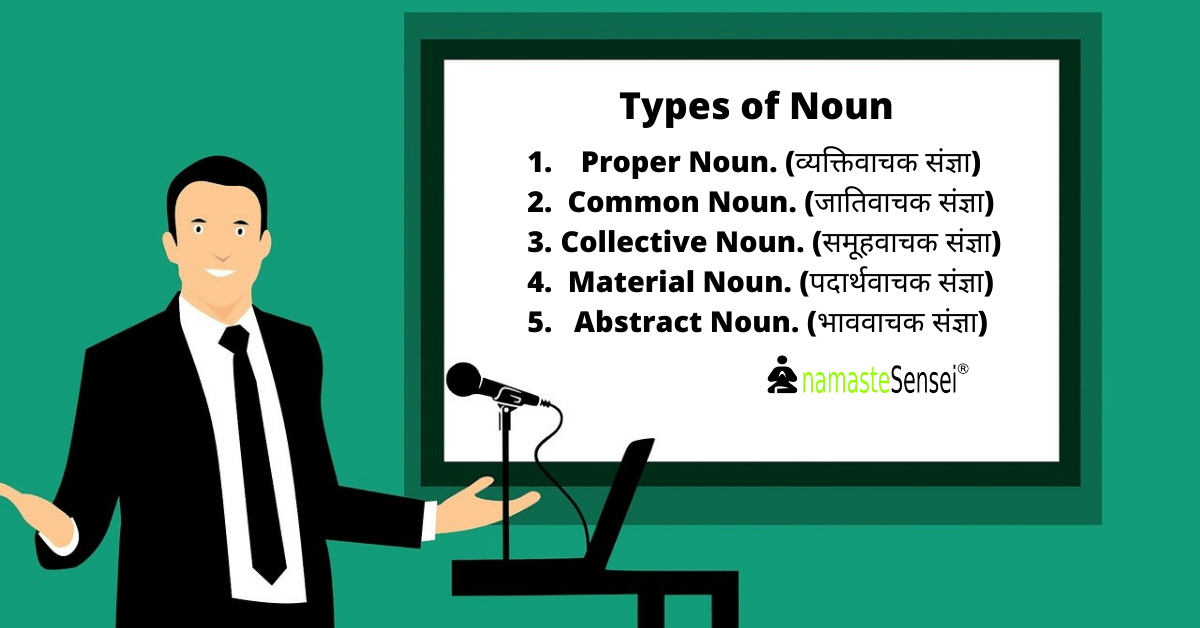

Sir the way of your making understanding is too good I wanna be in your contact
Yes sure, Pankaj you can contact us on
[email protected]